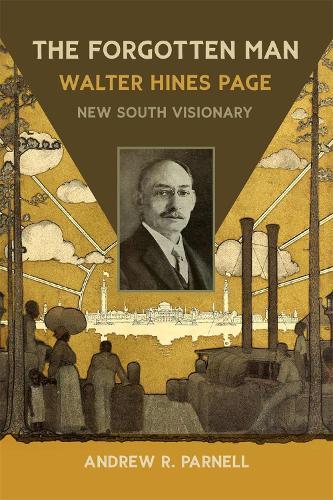Overview
The Forgotten Man is a biography of Walter Hines Page (1855–1918), a turn of the nineteenth-century North Carolinian writer, newspaper and magazine editor, political and educational reformer, and U.S. ambassador to Britain during the first World War. Page stood up to self-serving Southern politicians, helped defeat the antebellum myth entrenched in the legacy of slavery, was one of America's preeminent magazine editors, and campaigned for public school systems in the South. Andrew R. Parnell’s biography sheds new light on Page’s quest to improve the lives of fellow Americans, particularly those living in the South. For many, improvement and opportunity were impeded by the question of race in the South. Parnell contends that Page’s position on race was not as ""complex"" as is often implied; it was very simple: He believed in people as people regardless of race. Page was relentless in advocating for practical, proven solutions, often in the face of great resistance and criticism. In 1897he delivered his seminal Forgotten Man speech which emphasized that nothing (class, economic means, race, nor religion) should be a barrier to education; this speech was a catalyst for the transformation of education in the South. Page championed equality, universal education, and industrialization across the South, and his legacy includes laying the foundation for North Carolina State University. Page also profoundly influenced American culture in the early-twentieth century during his tenure at several national periodicals, most notably the Forum and the Atlantic, and then his own magazine, the World’s Work. Having established a national reputation as a defender of democracy, Page was asked by President Woodrow Wilson to serve as ambassador to Britain. Page’s actions during the War have wrongly attracted significant criticism, but Parnell shows how Page was looking out for America’s interests. Throughout his life, Page showed that democracy was not based on the idea that some people were born for labor and others were born to live luxuriously—but that all were free to strive for self-improvement.
Full Product Details
Author: Andrew R. Parnell
Publisher: University of Georgia Press
Imprint: University of Georgia Press
ISBN: 9780820367590
ISBN 10: 0820367591
Pages: 277
Publication Date: 15 November 2024
Audience:
Professional and scholarly
,
Professional & Vocational
Format: Hardback
Publisher's Status: Forthcoming
Availability: Not yet available

This item is yet to be released. You can pre-order this item and we will dispatch it to you upon its release.
Reviews
"This persuasive and elegantly written biography of Page rejects the myth of a rogue diplomat and racist. He is rediscovered as an enlightened individual committed to racial and gender equality, education, and democracy as drivers of change; and as a public figure, in the face of strong opposition, who was determined to pull the South into the twentieth century.--Simon Ville ""author of The Rural Entrepreneurs: A History of the Stock and Station Agent Industry in Australia and New Zealand"" The Forgotten Man does a wonderful job of putting Walter Hines Page's life into perspective. Page was the most important North Carolinian of the latter half of the nineteenth century. Later, became a respected journalist and book editor, and at the same time promoted a progressive agenda for the South--to move beyond its agrarian past and look toward industrialization as the future.--David W. Bulla, professor of communication at Augusta University"
"The Forgotten Man does a wonderful job of putting Walter Hines Page’s life into perspective. Page was the most important North Carolinian of the latter half of the nineteenth century. Later, became a respected journalist and book editor, and at the same time promoted a progressive agenda for the South—to move beyond its agrarian past and look toward industrialization as the future."" - David W. Bulla, professor of communication at Augusta University ""This persuasive and elegantly written biography of Page rejects the myth of a rogue diplomat and racist. He is rediscovered as an enlightened individual committed to racial and gender equality, education, and democracy as drivers of change; and as a public figure, in the face of strong opposition, who was determined to pull the South into the twentieth century."" - Simon Ville author of The Rural Entrepreneurs: A History of the Stock and Station Agent Industry in Australia and New Zealand"
Author Information
Andrew R. Parnell is a part-time senior analyst at the Australian Competition and Consumer Commission and part-time economic history PhD student. He lives in Melbourne, Australia.




